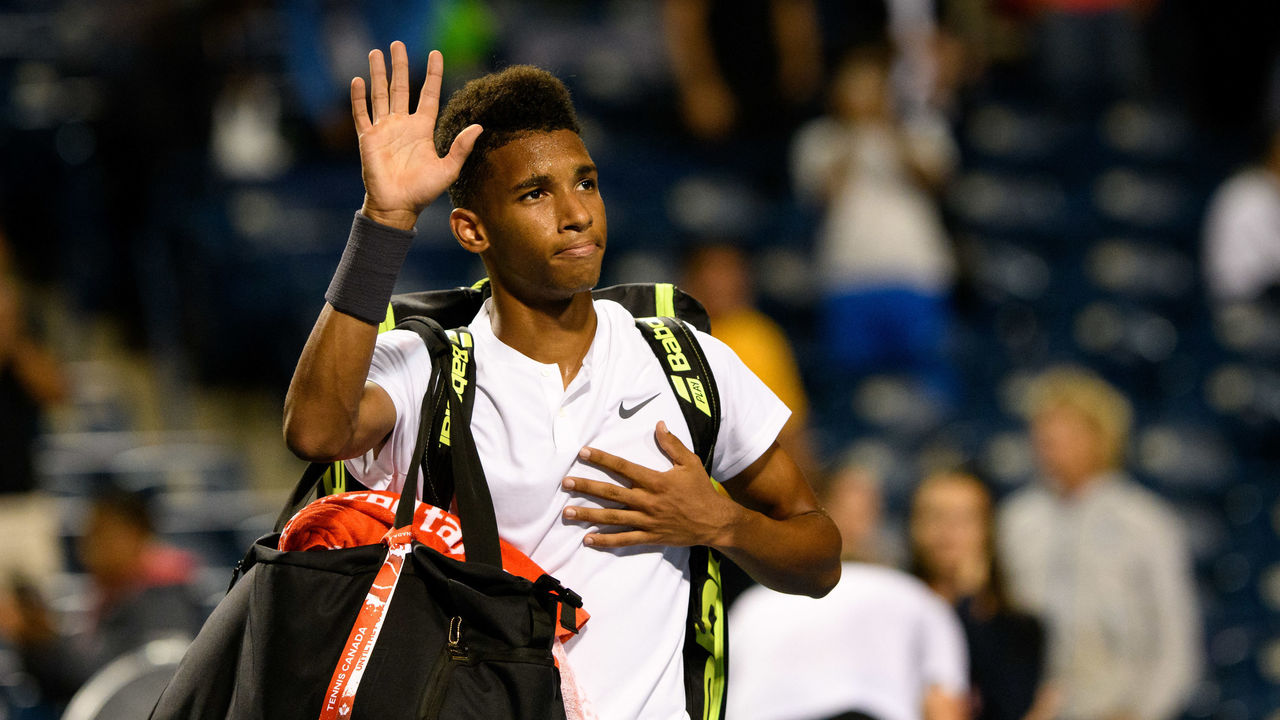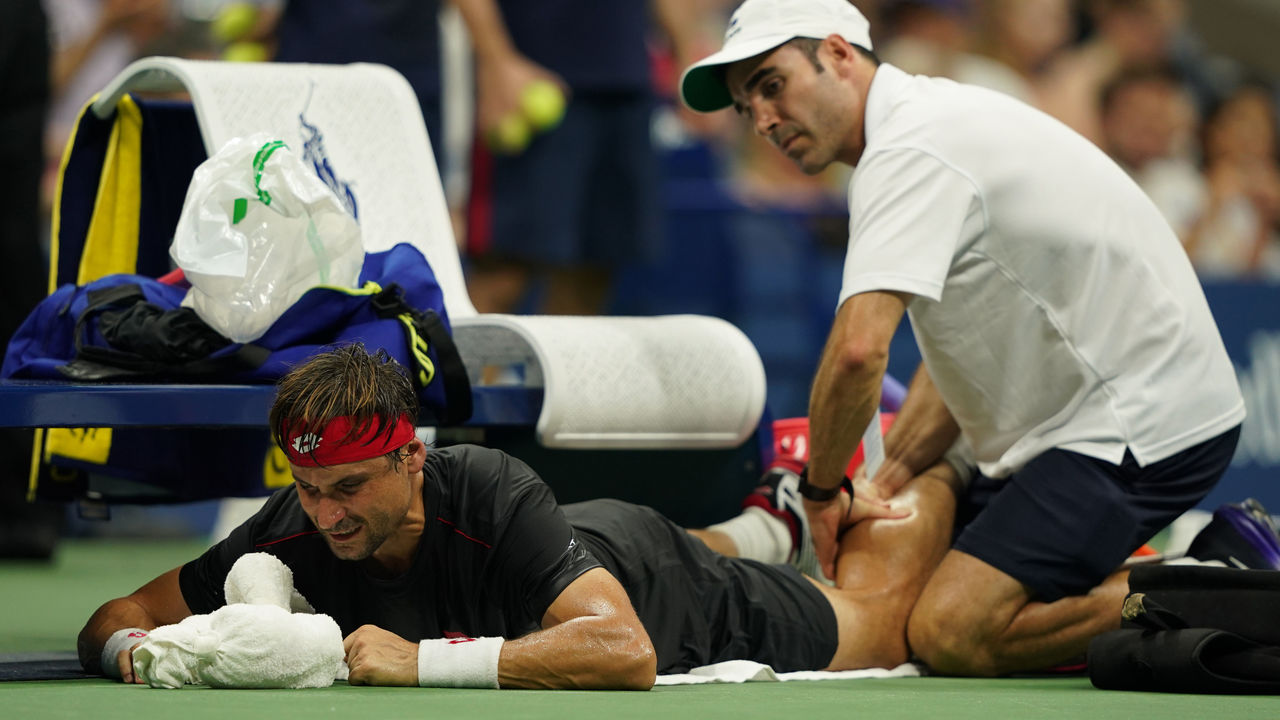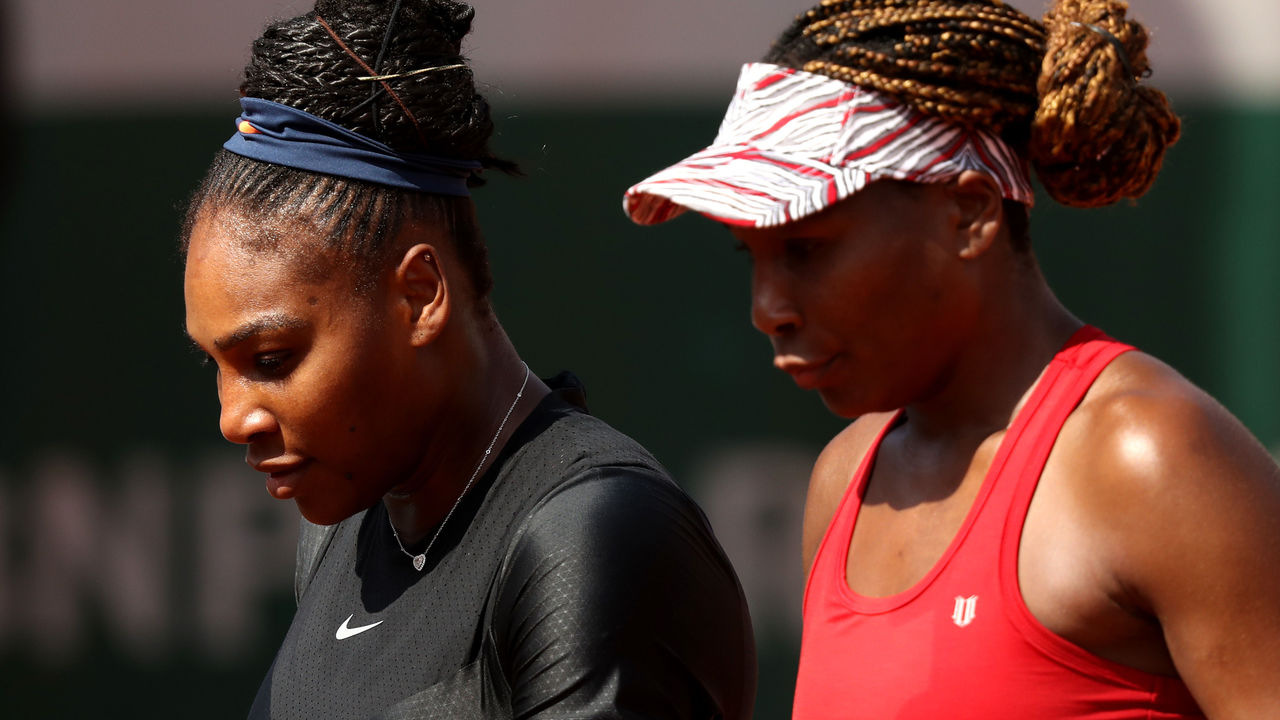'He deserves everything': Friendship and rivalry mingle at US Open
There was a surreal, almost eerie symmetry to the opening night of the US Open, where two of the most anticipated men's matches of the tournament's first round were contested by two pairs of close friends and countrymen.
One showcased 18-year-old Canadian wunderkind Felix Auger-Aliassime, playing in his first-ever Grand Slam main draw match, against equally prodigious (and equally Canadian) 19-year-old Denis Shapovalov. A few hours later, venerated veteran David Ferrer - more than twice Auger-Aliassime's age, with 722 more tour-level wins - played in his last-ever Grand Slam match, against his legendary Spanish compatriot Rafael Nadal.
The matches began auspiciously enough; the steady, fleet-footed Auger-Aliassime played ice to Shapovalov's fire as they split two tight sets, while Ferrer, overmatched though he was, played some of his best tennis in months to make the first set and change against Nadal competitive and entertaining. But both the debut and the swan song were cut short when both Auger-Aliassime and Ferrer retired due to physical ailments (likely exacerbated by the oppressive New York humidity), turning their milestone matches into avalanches of raw feeling. Auger-Aliassime, who suffers from a heart condition, was overcome by palpitations that refused to subside. Ferrer, who in 207 prior Grand Slam matches had never once retired, tried and failed to play through a calf injury.
Those moments would have been fraught enough on their own, but in each case, the man on the other side of the net brought the poignancy into even sharper relief. Before Auger-Aliassime and Ferrer pulled their ripcords, Shapovalov and Nadal had to try to stay the course while their opponents were in free fall. Shapovalov grew erratic and a bit tentative, knowing how little he needed to do to put Auger-Aliassime away but looking like he couldn't quite bring himself to do it. Nadal appeared even more rattled; at the sight of Ferrer limping around and suffering on the other side of the net, he seemed to completely lose his ability to play. He duffed routine forehands, sailed first serves, and allowed the hobbled 36-year-old to jump ahead in the second set. When Ferrer clocked a ridiculous down-the-line forehand winner on the run to break for 3-2, you had to wonder whether this wasn't all just a world-class possum play. Ferrer was still up a break in the second when he decided he could go no further.
The mandatory handshake at the net isn't just a vestige of tennis' age-old veneer of gentility, it's also the sport's great emotional litmus test. It offers possibilities ranging from the chilliest and most perfunctory palm taps to the most tender displays of empathy. (Perhaps the most indelible image from this year's Wimbledon was of Nadal climbing over the net and walking the 39 feet to the opposite baseline to hug Juan Martin del Potro after beating him in a near-five-hour quarterfinal.) When the retirements ended the by-then-uncomfortable matches Monday night, the spectacles morphed into something else. Shapovalov and Nadal, themselves welling up with emotion, embraced and consoled their disconsolate companions. Auger-Aliassime was particularly crushed, and Shapovalov - who'd tried earlier to settle him down and encourage him to keep going - followed his countryman from the middle of the court to his sideline chair, arm draped around him.

"I told him at the net, 'Look, we're going to be back here, we're going to be playing in the finals,'" Shapovalov said later, of the guy he's trained with for most of his teenage life, and whose basement he once inhabited in Montreal. "'This is just one match. We're going to have so many of these.'"
Nadal, of course, couldn't say the same to Ferrer. But he could help send him off with a decidedly personal touch.
"I'm very, very sorry for him," Nadal said in his on-court interview. "He's one of my closest friends on tour. We shared amazing moments together. Playing French Open final, playing Davis Cup and winning a couple of titles. He's one of the greatest tennis players that we had in our country, so it's sad for me to see him finish like this, but he deserves everything, because he is a very hard worker, a great person, and a fantastic player."
The circumstances may have been dramatically different, but both matches encapsulated the good and the bad - the joy and the anguish - that comes with competing at the highest level against someone you love. It was hard on the victors, but in the end, the losers were plainly grateful to have friends present in their moments of vulnerability. Ferrer had to have known that drawing Nadal meant his Grand Slam career wouldn't extend beyond Monday, but before the match, he nonetheless called the draw "a gift."
"It was special because I finish my last Grand Slam playing in the center court with Rafael Nadal, because he's a very good friend," Ferrer told reporters afterward, according to Sport360's Reem Abulleil. "Sad because I can't finish the match. (But) it's not a problem. I am a lucky man."
Nadal and Ferrer have played each other 31 times, which makes theirs the 10th-most prolific men's head-to-head of the Open era. But few would categorize their dynamic as a rivalry. Not just because the head-to-head has been laughably one-sided, with Nadal prevailing in 25 of those 31 meetings, but because there has never been any semblance of animosity or tension between them. That hasn't necessarily made for compelling drama, but it's been beautiful, in its way. If it's been a rivalry, then it's been one predicated not on enmity but on affection.
That was best exemplified by one of the rare matches Ferrer won: The 2011 Australian Open quarterfinal, when Nadal (who'd won the previous three Slams) suffered a hamstring injury and by match's end could hardly move. By all accounts, he should have retired, and against a different opponent perhaps he would have, but he didn't want to cheapen Ferrer's victory. Nor did Ferrer want to rub salt in Nadal's wound, so he barely allowed himself to celebrate what was at that point the biggest win of his career.

Though it would be shocking if their head-to-head wound up being so lopsided, it's not hard to imagine Shapovalov and Auger-Aliassime finding themselves in a similar place to the two Spaniards in a decade-and-a-half or so: At the tail end of a joint journey that saw them play myriad high-stakes matches, in which they battled each other like maniacs but afterward embraced as allies.
"We almost talk every day," Auger-Aliassime said of Shapovalov at the Rogers Cup earlier this month. "He's a great friend of mine, one of my best friends on tour, so we're pretty close, and we talk about anything. Nothing in particular, like normal teenager talks."
But the stakes for Shapovalov and Auger-Aliassime are only going to increase as they continue to grow into their bodies and hone their obscene gifts. Those stakes could strain or amplify their tight-knit bond, or both. If you consider all the conceivable success Nadal has denied Ferrer over the years, their friendship feels all the more unlikely.
Competition between friends comes to bear in just about every profession, sure, but rarely is it as tangibly manifest as it is in tennis, where income is so directly and immediately tied to performance against competitors. And rarely is it as personal as it is in tennis, where the person trying to take food out of your mouth is right in front of you. Maybe that's why the post-match handshake is necessary.
Few players have talked about this dynamic more often than Novak Djokovic, who has forged intimate rivalries with Nadal, Roger Federer, and Andy Murray.
"How can you go and be best friends with a guy who you know you are going to be doing battle with?" Djokovic said before playing Murray in the US Open final back in 2012. "It is true for myself, Roger, Rafa, and now Andy. We like each other and there is mutual respect but common sense tells you we can't be best friends and hang out."
As recently as this past spring, Djokovic was still singing more or less the same tune.
"We play big matches with much money at stake in the biggest events," he said, according to the Daily Express. "Because of this, I don't see enough space for an honest friendship."
To carve out that space requires serious compartmentalization, but there is certainly evidence of it happening, particularly among players who share a nationality or a background, who came up playing and training together, who grew close long before they started playing each other with ranking points and legacy and hundreds of thousands of dollars on the line, and who still have the chance to compete on the same side in the Davis Cup.

At the US Open in the past few years alone, we've seen a handful of examples. There was the heartwarming 2015 women's final between aging fellow Italians Flavia Pennetta and Roberta Vinci, two longtime friends experiencing a moment in the sun that they'd never imagined would come and knew would never come again. Or last year's final between young Americans Sloane Stephens and Madison Keys, after which Keys' bitter disappointment at her disastrous performance was washed down by some quippy trophy-ceremony banter with Stephens. In both cases, after the emotional tension of the matches themselves, in which each woman wrestled with the idea of denying the other a Grand Slam title, friendship ultimately pushed competition to the side.
And, of course, there are Serena and Venus Williams, who represent perhaps the most extraordinary example of compartmentalization in the history of pro sports. The Williams sisters have faced each other 29 times, including 15 times at Slams. The last major match they played was the 2017 Australian Open final, a typically uneasy affair that ended with Serena beating Venus to capture a record-setting 23rd major title, and being so torn between wanting to do celebratory justice to the achievement and not wanting to show up her sister that she wound up just doing a little half-twirl and then sitting down on the court, in what was probably the most awkward championship pose of her career. But again, once the two of them were on the podium together, all the discomfiture of the match seemed to melt away, as they got to soak in the historic moment together.
Serena and Venus could meet for the 30th time in the third round of this US Open. If it comes to pass, we can expect it to produce, as always, an equally potent dose of joy and anguish.
(Photos courtesy: Getty Images)
HEADLINES
- Tennis Australia's Craig Tiley to become CEO of USTA
- Venus Williams earns wild-card return to Indian Wells for singles, doubles
- Tennis participation reaches new high in USA, says association
- Pegula leading efforts to improve the women's tennis calendar
- Serena is soon eligible for tennis comeback. It's unclear if she'll do it